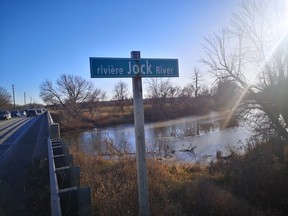A report identified several “gaps in city processes that could have resulted in decisions that were not in the best interest of the city or its residents.”
Published Nov 24, 2023 • Last updated 4 hours ago • 6 minute read
 Auditor General Nathalie Gougeon has released a scathing, 14-page report detailing her team’s investigation into the handling of The Conservancy residential development project after allegations of mismanagement were made through the city’s fraud and waste hotline. Photo by Jean Levac /POSTMEDIA NEWS
Auditor General Nathalie Gougeon has released a scathing, 14-page report detailing her team’s investigation into the handling of The Conservancy residential development project after allegations of mismanagement were made through the city’s fraud and waste hotline. Photo by Jean Levac /POSTMEDIA NEWS
The City of Ottawa’s auditor general has slammed municipal officials for mishandling a major housing development in Barrhaven that involved extensive alterations of the Jock River floodplain to accommodate a sprawling new subdivision with nearly 1,000 new homes.
Auditor General Nathalie Gougeon has released a scathing, 14-page report detailing her team’s investigation into the project after allegations of mismanagement were made through the city’s fraud and waste hotline. The report has been tabled for discussion at the city’s audit committee meeting on Monday.
Advertisement 2
This advertisement has not loaded yet, but your article continues below.
THIS CONTENT IS RESERVED FOR SUBSCRIBERS ONLY
Subscribe now to read the latest news in your city and across Canada.
Exclusive articles from Elizabeth Payne, David Pugliese, Andrew Duffy, Bruce Deachman and others. Plus, food reviews and event listings in the weekly newsletter, Ottawa, Out of Office.Unlimited online access to Ottawa Citizen and 15 news sites with one account.Ottawa Citizen ePaper, an electronic replica of the print edition to view on any device, share and comment on.Daily puzzles, including the New York Times Crossword.Support local journalism.
SUBSCRIBE TO UNLOCK MORE ARTICLES
Subscribe now to read the latest news in your city and across Canada.
Exclusive articles from Elizabeth Payne, David Pugliese, Andrew Duffy, Bruce Deachman and others. Plus, food reviews and event listings in the weekly newsletter, Ottawa, Out of Office.Unlimited online access to Ottawa Citizen and 15 news sites with one account.Ottawa Citizen ePaper, an electronic replica of the print edition to view on any device, share and comment on.Daily puzzles, including the New York Times Crossword.Support local journalism.
REGISTER TO UNLOCK MORE ARTICLES
Create an account or sign in to continue with your reading experience.
Access articles from across Canada with one account.Share your thoughts and join the conversation in the comments.Enjoy additional articles per month.Get email updates from your favourite authors.
Article content
Article content
The allegations concern the 2018-21 handling of approvals and reviews by the city’s Planning, Real Estate and Economic Development Department for The Conservancy, a planned 140-acre residential development in Barrhaven encompassing three kilometres of Jock River shoreline property just west of the confluence of the Jock and Rideau rivers.
 A report from city auditor general Nathalie Gougeon identified several “gaps in city processes that could have resulted in decisions that were not in the best interest of the city or its residents.” Photo by Tony Caldwell /POSTMEDIA
A report from city auditor general Nathalie Gougeon identified several “gaps in city processes that could have resulted in decisions that were not in the best interest of the city or its residents.” Photo by Tony Caldwell /POSTMEDIA
The auditor identified several “gaps in city processes that could have resulted in decisions that were not in the best interest of the city or its residents,” the report states.
The overall development area, designed for a combination of detached houses and townhomes, is roughly bounded by the Jock River to the south, Strandherd Drive to the north, Highway 416 to the west and Greenbank Road to the east.
Among the key findings of the auditor’s probe were that municipal staff failed to keep city councillors properly informed as major changes were made to the plan initially proposed by development company Caivan Communities — specifically a decision to halt remapping of the Jock River floodplain and to instead initiate a “cut and fill” re-sculpting of the shoreline and adjacent ground to create a higher, flood-proof zone for construction of some of the new homes.
Advertisement 3
This advertisement has not loaded yet, but your article continues below.
Article content
The plan involved cutting away more than 100,000 cubic metres of soil along the north shore of the Jock and depositing more than 400,000 cubic metres of soil on adjacent land immediately to the north so houses could be safely built there, beyond any flood risk.
 Most of the land on which The Conservancy residential development in Barrhaven is planned is currently a mix of barren, windswept fields and scrubby bushland along the Jock River. Photo by Randy Boswell /POSTMEDIA
Most of the land on which The Conservancy residential development in Barrhaven is planned is currently a mix of barren, windswept fields and scrubby bushland along the Jock River. Photo by Randy Boswell /POSTMEDIA
The Rideau Valley Conservation Authority described Caivan’s cut-and-fill plan as the largest of its kind ever proposed in the Rideau River watershed. While the RVCA ultimately approved the developer’s proposal to transform the Jock’s floodplain, the agency was inappropriately pressured by city staff to give a green light to the plan, the auditor found.
In November 2019, as the RVCA was preparing to assess the company’s proposal for major floodplain alterations, a senior city planning official wrote to the conservation authority that “we want to reinforce the support (Ottawa) council has expressed for this file” — a clear signal that the city’s elected officials were backing the housing developer’s ambitious plans along the Jock waterfront and that the RVCA should approve the project.
However, the auditor’s team determined that councillors were actually unaware of the new “cut and fill” proposal at that time and still assumed a remapping of the floodplain was in progress — essentially an update of 15-year-old predictions of how high floodwater might get in the area using more advanced mapping tools.
Advertisement 4
This advertisement has not loaded yet, but your article continues below.
Article content
That planned remapping was halted, however, when RVCA and city experts determined there would be no significant changes to the floodplain analysis from 2005.
Not only was the city letter highlighting council’s “endorsement” inaccurate, expressing such an endorsement was out of bounds to begin with, the auditor said.
“It is not the city’s role as part of the planning process to endorse, support or advocate for a developer’s application with another regulatory body, such as the RVCA,” the auditor’s report states. Furthermore, “it was confirmed that the issuance of this letter was a violation of departmental processes as this external communication was not signed off on by the general manager.”
The investigation report emphasizes the need for Ottawa’s planning department to “establish a formal policy outlining that the city does not take an advocacy or endorsement position for any developer or development as input into a third-party’s decision making.”
A response to the recommendation from the department included in the report states: “Management will be issuing a communication to staff outlining city staff’s obligation to provide information, analysis and any applicable council decision and reiterate staff does not take an advocacy or endorsement position for any developer or development as input into a third-party’s decision.”
Advertisement 5
This advertisement has not loaded yet, but your article continues below.
Article content
Finally, the auditor identified fundamental problems with the way the city used an outside consultant to oversee the developer’s application for its “cut and fill” plan to create space for additional housing units.
Because of the complexity of the project, the consultant ended up relying heavily on senior city staff to carry out the terms of the contract, leading the auditor to question the merits of hiring of the consultant in the first place.
Officials in the city’s asset management branch who were interviewed by the audit team “indicated that it was surprising that management outsourced the (development) review and confirmed that, despite this, they were informally asked for input because of their specialization and expertise and to bridge gaps in the understanding of the consultant.”
They also “confirmed their surprise that the (city’s asset management branch) did not conduct the review and indicated that, from their perspective, AMB staff tend to take a longer-term view as compared to an external consultant, who would have a short-term, technical perspective.”
Advertisement 6
This advertisement has not loaded yet, but your article continues below.
Article content
Because the consultant was nominally in charge of the review, though, key city staff did not have a full sense of what was happening as the modified development application progressed towards approval.
“Removing key city representatives with the applicable technical skills and perspectives from the application review process increases the risk that equipment and processes being proposed by the developer may not be in the best interest of the city,” the auditor concludes. “For all stages of the development application process, if a consultant is leveraged to conduct a peer review, the (planning department) should establish a formal role for city subject matter experts to ensure the impact on city infrastructure is fully evaluated.”
 Along Borrisokane Road, which dissects the planned development between Strandherd Drive and the Jock River, huge signs proclaim “Welcome to The Conservancy” and show illustrated scenes of happy homeowners. Photo by Randy Boswell /POSTMEDIA
Along Borrisokane Road, which dissects the planned development between Strandherd Drive and the Jock River, huge signs proclaim “Welcome to The Conservancy” and show illustrated scenes of happy homeowners. Photo by Randy Boswell /POSTMEDIA
Many of the problems identified by the auditor were flagged in real time three years ago by former city councillor and 2022 mayoral candidate Catherine McKenney.
McKenney raised objections in June 2020 about the way city staff were handling The Conservancy project. In particular, McKenney described the November 2019 letter of “endorsement” sent to the RVCA by a top city planning official as misleading and inappropriate.
Advertisement 7
This advertisement has not loaded yet, but your article continues below.
Article content
“I don’t know why senior staff would suggest very strongly in a letter to the conservation authority that council had approved the fill permit when that in fact wasn’t the case,” McKenney told CBC at the time. “I never supported a fill permit on a flood plain.”
The Conservancy project remains years from completion, but Caivan has pre-sold many of the homes expected to be built there. The company’s website describes the planned community as one of its showcase projects and emphasizes its proximity to the meandering Jock River.
“Discover Ottawa’s most anticipated master-planned community. Set along the historic Jock River at the centre of established Barrhaven amenities, The Conservancy offers a full range of new and innovative home designs, expansive and connected green space, and integration with transit.”
Most of the land on which the development is planned is currently a mix of barren, windswept fields and scrubby bushland along the Jock River. Along Borrisokane Road, which dissects the planned development between Strandherd Drive and the murky Rideau River tributary, huge signs on both sides proclaim “Welcome to The Conservancy” and show illustrated scenes of happy homeowners strolling on streamside pathways or preparing for a paddle with a child and pet dog in a canoe.
The future community is hailed as “an unprecedented opportunity to connect to nature” with “140 acres of greenspace integrated with over three kilometres of river frontage” on the Jock River connecting to the Rideau.
Related Stories

How an X user put the Sens arena on (and off) the map
Driver charged in death of pedestrian in Ottawa on Oct. 2
Our website is your destination for up-to-the-minute news, so make sure to bookmark our homepage and sign up for our newsletters so we can keep you informed.
Article content
>>> Read full article>>>
Copyright for syndicated content belongs to the linked Source : OttawaCitizen – https://ottawacitizen.com/news/local-news/auditor-slams-city-of-ottawa-officials-over-handling-of-barrhaven-housing-development










